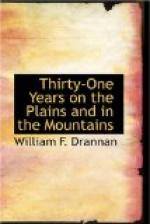“Boys, I am afraid we have made a mistake in coming here to trap this winter; we must be near the Blackfoot Indians, for I just killed one that was driving our horses off, and I just happened to see him in time to catch him with old Blackleg.” At that time the Blackfoot Indians were considered worst tribe in the entire Northwest.
I went at once to the other camp to notify Jim Bridger and his crowd that they might be on their guard. Bridger said he had been expecting it, as he had seen fresh Indian sign out on the ridges some days before, but thought it was getting so late now that they would not give us any more trouble this winter, but that we would have to get out early the next spring.
We stayed here and trapped all winter, with splendid success. Jim Bridger took twelve beaver from his string of traps every twenty-four hours for seven successive days, being the greatest catch I ever knew from one string of traps.
About the last of March we commenced making preparations to leave the mountains, for fear the Indians might come and clean us out.
The day before we were to start there came a heavy fall of snow, and we were not able to move until the first of April, when we made another start for Santa Fe, going via Sweetwater, and we had enough furs to load our entire train.
The second day after leaving camp we were attacked, about noon, by twenty Indians of the Blackfoot tribe, who entertained us for about an hour.
We huddled our horses and used them for breast-works, and killed seven Indians without one of our men being wounded, but we lost two horses.
It might be well to describe the manner in which trappers traveled those days while passing through a country where there were hostile Indians.
Each man would take the number of horses he was to lead and string them out and fasten them together by tying each horse to the tail of the horse ahead of him and the head horse of the string he would tie to the tail of his saddle-horse. This had to be done to prevent a stampede when attacked, and the horses, too, were a great protection to the men, for when they were attacked by Indians the men would ride to the center and use the horses for breastworks in time of battle.
After the fight was over the boys all felt jubilant over their victory. We had no more trouble with Indians for four days, when we reached Rock Creek, a beautiful little mountain stream that pays tribute to the North Platte river. Here was a nice place to camp; plenty of wood and an abundance of grass, and the finest water in the land. Here was a lovely valley, and just off to the northwest was a little hill or ridge, only a short distance from which we made our camp. Some of the men went to getting wood and building a fire, while others were unpacking, not thinking of Indians, and just as the packs were off we were aroused by the war-whoop of a little squad of Indians who were coming over the ridge spoken of. We had a hot little fight, but it only lasted a few minutes, when the Indians withdrew, and Uncle Kit gave orders to follow them, which we did, and had a running fight for about five miles. We captured five horses from the redskins, and in the affair did not lose a man, nor even a horse.




